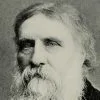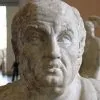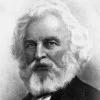Be mersiphull to all the dum animals — no man can ride into heaven, on a sore-backed horse.
[Be merciful to all the dumb animals — no man can ride into heaven on a sore-backed horse.]
Josh Billings (1818-1885) American humorist, aphorist [pseud. of Henry Wheeler Shaw]
Josh Billings’ Trump Kards, ch. 11 “The Mermaid” (1874)
(Source)
Quotations about:
mercy
Note not all quotations have been tagged, so Search may find additional quotes on this topic.
If grace be grace, and Allah gracious be,
Adam from Paradise why banished He?
Grace to poor sinners shown is grace indeed;
In grace hard earned by works no grace I see.Omar Khayyám (1048-1123) Persian poet, mathematician, philosopher, astronomer [عمر خیام]
Rubáiyát [رباعیات], [tr. Whinfield (1883), # 102]
(Source)
While numbered as # 102 in most locations, it is given as # 57 here.
I was unable to find alternate translations or analogs to this quatrain from Whinfield. The closest (but a bit of a stretch):If sinfully I drudge, where is Your mercy?
If clouds darken my heart, where is Your light?
Heaven rewards my practice of obedience;
Rewards well-earned are good -- but what of grace?
[tr. Graves & Ali-Shah (1967), # 86]
Once, I remember, Father Abbot said that our purpose is justice, and with God lies the privilege of mercy. But even God, when he intends mercy, needs tools to his hand.
Ellis Peters (1913-1995) English writer, translator [pseud. of Edith Mary Pargeter, who also wrote under the names John Redfern, Jolyon Carr, Peter Benedict]
Dead Man’s Ransom, ch. 15, [Cadfael] (1984)
(Source)
Closing words of the book.
More helpful than all wisdom is one draught of simple human pity that will not forsake us.
George Eliot (1819-1880) English novelist [pseud. of Mary Ann Evans]
The Mill on the Floss, Book 7, ch. 1 (1860)
(Source)
Consequences are unpitying.
George Eliot (1819-1880) English novelist [pseud. of Mary Ann Evans]
Adam Bede, Book 1, ch. 16 “Links” [Mr. Irwine] (1859)
(Source)
But justice commands us to have mercy upon all men, to consult the interests of the whole human race, to give to every one his due, and injure no sacred, public, or foreign rights, and to forbear touching what does not belong to us.
[Iustitia autem praecipit parcere omnibus, consulere generi hominum, suum cuique reddere, sacra, publica, aliena non tangere.]
Marcus Tullius Cicero (106-43 BC) Roman orator, statesman, philosopher
De Re Publica [On the Republic, On the Commonwealth], Book 3, ch. 15 / sec. 24 (3.24) [Philus] (54-51 BC) [tr. Yonge (1853), ch. 12]
(Source)
Contrasting the dictates of justice, vs the wisdom/prudence of conquest. Earlier sources arrange the fragments to make this ch. 12, as noted. (Source (Latin)). Alternate translations:But justice orders us to spare all, to consult the welfare of mankind, to give to every one his own, and to abstain from every thing that is sacred, every thing that is public, every thing which is not our own.
[tr. Featherstonhaugh (1829), ch. 12]But justice commands us to have mercy upon all men, to consult the interests of the whole human race, to give to every one his due, and injure no sacred, public, or foreign rights, and to forbear touching what does not belong to us.
[tr. Barham (1841), ch. 12]Justice, on the other hand, instructs us to spare all men, to consider the interests of the whole human race, to give everyone his due, and not to touch the sacred or public property, or that which belongs to others.
[tr. Keyes (1928)]Justice, on the other hand, teaches you to spare all men, to consider the interests of the human race, to render to each his own, and not to tamper with that which is sacred, that which is public, and that which belongs to another. [tr. Sabine/Smith (1929)]Justice, on the other hand, teaches us to spare all men, take thought for the interests of mankind, give everyone his due, and not lay hands on the things belonging to the gods, the state, or somebody else.
[tr. Rudd (1998)]Justice instructs us to spare everyone, to look after the interests of the human race, to render to each his own, to keep hands off things that are sacred or public or belong to someone else.
[tr. Zetzel (1999), ch. 24b]But justice instructs [us] to spare everyone, to take care of the human race, to render to each his own, not to touch sacred things, public things, another's things.
[tr. Fott (2014)]
A person who has no genuine sense of pity for the weak is missing a basic source of strength, for one of the prime moral forces that comprise greatness and strength of character is a feeling of mercy. The ruthless man, au fond, is always a weak and frightened man.
We vainly accuse the fury of Gunnes, and the new inventions of death; ’tis in the power of every hand to destroy us, and wee are beholding unto every one wee meete hee doth not kill us.
[We vainly accuse the fury of guns, and the new inventions of death; it is in the power of every hand to destroy us, and we are beholden unto every one we meet he doth not kill us.]
Thomas Browne (1605-1682) English physician and author
Religio Medici, Part 1, sec. 43 (1643)
(Source)
If we merge mercy with might,
and might with right,
then love becomes our legacy
and change our children’s birthright.Amanda Gorman (b. 1998) American poet and activist
“The Hill We Climb” (2021)
(Source)
Read at the Presidential Inauguration (20 Jan 2021).
Never does the human soul appear so strong as when it foregoes revenge, and dares to forgive an injury.
Who will not mercie unto others shew,
How can he mercy ever hope to have?Edmund Spenser (c. 1552-1599) English poet
The Faerie Queene, Book 6, Canto 1, st. 42 (1589-96)
(Source)
See James 2:13.
I’ve seen the meanness of humans till I don’t know why God ain’t put out the sun and gone away.
Cormac McCarthy (1933-2023) American novelist, playwright, screenwriter
Outer Dark, ch. 17 (1968)
(Source)
Here lie I, Martin Elginbrodde:
Hae mercy o’ my soul, Lord God;
As I wad do, were I Lord God,
And ye were Martin Elginbrodde.
Jesus replied, “A man was going down from Jerusalem to Jericho, and fell into the hands of robbers, who stripped him, beat him, and went away, leaving him half dead. Now by chance a priest was going down that road; and when he saw him, he passed by on the other side. So likewise a Levite, when he came to the place and saw him, passed by on the other side.
But a Samaritan while traveling came near him; and when he saw him, he was moved with pity. He went to him and bandaged his wounds, having poured oil and wine on them. Then he put him on his own animal, brought him to an inn, and took care of him. The next day he took out two denarii, gave them to the innkeeper, and said, ‘Take care of him; and when I come back, I will repay you whatever more you spend.’
Which of these three, do you think, was a neighbor to the man who fell into the hands of the robbers?” He said, “The one who showed him mercy.” Jesus said to him, “Go and do likewise.”
The Bible (The New Testament) (AD 1st - 2nd C) Christian sacred scripture
Luke 10:30-37 [NRSV]
(Source)
Alt. trans. [KJV]: "And Jesus answering said, A certain man went down from Jerusalem to Jericho, and fell among thieves, which stripped him of his raiment, and wounded him, and departed, leaving him half dead. And by chance there came down a certain priest that way: and when he saw him, he passed by on the other side. And likewise a Levite, when he was at the place, came and looked on him, and passed by on the other side. But a certain Samaritan, as he journeyed, came where he was: and when he saw him, he had compassion on him, and went to him, and bound up his wounds, pouring in oil and wine, and set him on his own beast, and brought him to an inn, and took care of him. And on the morrow when he departed, he took out two pence, and gave them to the host, and said unto him, Take care of him; and whatsoever thou spendest more, when I come again, I will repay thee. Which now of these three, thinkest thou, was neighbour unto him that fell among the thieves? And he said, He that shewed mercy on him. Then said Jesus unto him, Go, and do thou likewise."
Alt. trans. [GNT]: "Jesus answered, “There was once a man who was going down from Jerusalem to Jericho when robbers attacked him, stripped him, and beat him up, leaving him half dead. It so happened that a priest was going down that road; but when he saw the man, he walked on by on the other side. In the same way a Levite also came there, went over and looked at the man, and then walked on by on the other side. But a Samaritan who was traveling that way came upon the man, and when he saw him, his heart was filled with pity. He went over to him, poured oil and wine on his wounds and bandaged them; then he put the man on his own animal and took him to an inn, where he took care of him. The next day he took out two silver coins and gave them to the innkeeper. ‘Take care of him,’ he told the innkeeper, ‘and when I come back this way, I will pay you whatever else you spend on him.’” And Jesus concluded, “In your opinion, which one of these three acted like a neighbor toward the man attacked by the robbers?” The teacher of the Law answered, “The one who was kind to him.” Jesus replied, “You go, then, and do the same.”
For some reason, the most vocal Christians among us never mention the Beatitudes. But, often with tears in their eyes, they demand that the Ten Commandments be posted in public buildings. And of course, that’s Moses, not Jesus. I haven’t heard one of them demand that the Sermon on the Mount, the Beatitudes, be posted anywhere. “Blessed are the merciful” in a courtroom? “Blessed are the peacemakers” in the Pentagon? Give me a break!
Kurt Vonnegut, Jr. (1922-2007) American novelist, journalist
A Man Without A Country, ch. 9 (2005)
(Source)
The Beatitudes (Matthew 5).
Nothing discloses real character like the use of power. It is easy for the weak to be gentle. Most people can bear adversity. But if you wish to know what a man really is, give him power. This is the supreme test. It is the glory of Lincoln that, having almost absolute power, he never abused it, except upon the side of mercy.
Robert Green Ingersoll (1833-1899) American lawyer, agnostic, orator
“Abraham Lincoln,” Lecture (1894)
(Source)
Ingersoll used the final phrase here frequently about Lincoln, e.g., in The Liberty of Man, Woman, and Child, an 1877 lecture, he wrote: "Abraham Lincoln was, in my judgment, in many respects, the grandest man ever president of the United States. Upon his monument these words should be written: 'Here sleeps the only man in the history of the world, who, having been clothed with almost absolute power, never abused it, except on the side of mercy.'"
The phrase "But if you wish to know what a man really is, give him power" is often attributed, without citation, to Lincoln.
Thus says the Lord of hosts: Render true judgments, show kindness and mercy to one another; do not oppress the widow, the orphan, the alien, or the poor; and do not devise evil in your hearts against one another.
But they refused to listen and turned a stubborn shoulder and stopped their ears in order not to hear. They made their hearts adamant in order not to hear the law and the words that the Lord of hosts had sent by his spirit through the former prophets. Therefore great wrath came from the Lord of hosts.The Bible (The Old Testament) (14th - 2nd C BC) Judeo-Christian sacred scripture [Tanakh, Hebrew Bible], incl. the Apocrypha (Deuterocanonicals)
Zechariah 7:9-12 [NRSV (2021 ed.)]
(Source)
Alternate translations:Thus speaketh the Lord of hosts, saying, Execute true judgment, and shew mercy and compassions every man to his brother:
And oppress not the widow, nor the fatherless, the stranger, nor the poor; and let none of you imagine evil against his brother in your heart.
But they refused to hearken, and pulled away the shoulder, and stopped their ears, that they should not hear.
Yea, they made their hearts as an adamant stone, lest they should hear the law, and the words which the Lord of hosts hath sent in his spirit by the former prophets: therefore came a great wrath from the Lord of hosts.
[KJV (1611)]Yahweh Sabaoth says this. He said, "Apply the law fairly, and practice kindness and compassion towards one another. Do not oppress the widow and the orphan, the settler and the poor man, and do not secretly plan evil against one another." But they would not pay attention; they turned a petulant shoulder; they stopped their ears rather than hear; they made their hearts adamant rather than listen to the teaching and the words that Yahweh Sabaoth had sent by his spirit through the prophets in the past. This aroused great anger on the part of of Yahweh Sabaoth overtook them.
[JB (1966)]“Long ago I gave these commands to my people: ‘You must see that justice is done, and must show kindness and mercy to one another. Do not oppress widows, orphans, foreigners who live among you, or anyone else in need. And do not plan ways of harming one another.’
“But my people stubbornly refused to listen. They closed their minds and made their hearts as hard as rock. Because they would not listen to the teaching which I sent through the prophets who lived long ago, I became very angry."
[GNT (1976)]'Yahweh Sabaoth says this. He said, "Apply the law fairly, and show faithful love and compassion towards one another.
Do not oppress the widow and the orphan, the foreigner and the poor, and do not secretly plan evil against one another."
But they would not listen; they turned a rebellious shoulder; they stopped their ears rather than hear;
they made their hearts adamant rather than listen to the teaching and the words that Yahweh Sabaoth had sent -- by his spirit -- through the prophets in the past; and consequently the fury of Yahweh Sabaoth overtook them.
[NJB (1985)]The Lord of heavenly forces proclaims:
Make just and faithful decisions; show kindness and compassion to each other! Don’t oppress the widow, the orphan, the stranger, and the poor; don’t plan evil against each other! But they refused to pay attention. They turned a cold shoulder and stopped listening.
They steeled their hearts against hearing the Instruction and the words that the Lord of heavenly forces sent by his spirit through the earlier prophets. As a result, the Lord of heavenly forces became enraged.
[CEB (2011)]Thus said GOD of Hosts: Execute true justice; deal loyally and compassionately with one another.
Do not defraud the widow, the orphan, the stranger, and the poor; and do not plot evil against one another. --
But they refused to pay heed. They presented a balky back and turned a deaf ear.
They hardened their hearts like adamant against heeding the instruction and admonition that GOD of Hosts sent to them by divine spirit through the earlier prophets; and a terrible wrath issued from GOD of Hosts.
[RJPS (2023 ed.)]
PORTIA: The quality of mercy is not strained.
It droppeth as the gentle rain from heaven
Upon the place beneath. It is twice blest:
It blesseth him that gives and him that takes.
’Tis mightiest in the mightiest; it becomes
The thronèd monarch better than his crown.
His scepter shows the force of temporal power,
The attribute to awe and majesty
Wherein doth sit the dread and fear of kings;
But mercy is above this sceptered sway.
It is enthronèd in the hearts of kings;
It is an attribute to God Himself;
And earthly power doth then show likest God’s
When mercy seasons justice.William Shakespeare (1564-1616) English dramatist and poet
Merchant of Venice, Act 4, sc. 1, l. 190ff (4.1.190-203) (1597)
(Source)
He who is only just is cruel; who
Upon the earth would live were all judged justly?George Gordon, Lord Byron (1788-1824) English poet
Marino Faliero, Doge of Venice, Act 5, sc. 1 [Angiolina] (1821)
(Source)
“What a pity that Bilbo did not stab that vile creature, when he had a chance!”
“Pity? It was Pity that stayed his hand. Pity, and Mercy: not to strike without need. And he has been well rewarded, Frodo. Be sure that he took so little hurt from the evil, and escaped in the end, because he began his ownership of the Ring so. With Pity.”J.R.R. Tolkien (1892-1973) English writer, fabulist, philologist, academic [John Ronald Reuel Tolkien]
The Lord of the Rings, Vol. 1: The Fellowship of the Ring, Book 1, ch. 2 “The Shadow of the Past” [Frodo and Gandalf] (1954)
(Source)
PORTIA: Though justice be thy plea, consider this:
That in the course of justice none of us
Should see salvation. We do pray for mercy,
And that same prayer doth teach us all to render
The deeds of mercy.William Shakespeare (1564-1616) English dramatist and poet
Merchant of Venice, Act 4, sc. 1, l. 204ff (4.1.204-208) (1597)
(Source)
I have bought this wonderful machine — a computer. Now I am rather an authority on gods, so I identified the machine — it seems to me to be an Old Testament god with a lot of rules and no mercy.
Joseph Campbell (1904-1987) American writer, professor of literature
The Power of Myth, ch. 1 (1988)
(Source)
From interviews between Campbell and Bill Moyers in 1985-86. Broadcast as episode 2 of the PBS television show of the same name. Often truncated: "A computer is like an Old Testament god, with a lot of rules and no mercy."
I have made up my mind that if there is a God, he will be merciful to the merciful.
Upon that rock I stand.
That he will not torture the forgiving.
Upon that rock I stand.
That every man should be true to himself, and that there is no world, no star, in which honesty is a crime.
Upon that rock I stand.
The honest man, the good woman, the happy child, have nothing to fear, either in this world or the world to come.
Upon that rock I stand.Robert Green Ingersoll (1833-1899) American lawyer, agnostic, orator
“What Must We Do to Be Saved?” Sec. 11 (1880)
(Source)
FIRST STRANGER: Men must learn now with pity to dispense,
For policy sits above conscience.William Shakespeare (1564-1616) English dramatist and poet
Timon of Athens, Act 3, sc. 2, l. 93ff (3.2.93-94) (1606) [with Thomas Middleton]
(Source)
When the Egyptians were drowning in the Red Sea, the angels in heaven began to break forth in songs of jubilation, but the Holy One, blessed be He, silenced them: “My creatures are perishing — and ye are ready to sing!”
Do not judge, and you will not be judged; do not condemn, and you will not be condemned; forgive, and you will be forgiven. Give, and there will be gifts for you: a full measure, pressed down, shaken together, and overflowing, will be poured into your lap; because the standard you use will be the standard used for you.
[Καὶ μὴ κρίνετε, καὶ οὐ μὴ κριθῆτε· καὶ μὴ καταδικάζετε, καὶ οὐ μὴ καταδικασθῆτε. ἀπολύετε, καὶ ἀπολυθήσεσθε· δίδοτε, καὶ δοθήσεται ὑμῖν· μέτρον καλὸν πεπιεσμένον σεσαλευμένον ὑπερεκχυννόμενον δώσουσιν εἰς τὸν κόλπον ὑμῶν· ᾧ γὰρ μέτρῳ μετρεῖτε ἀντιμετρηθήσεται ὑμῖν.]
The Bible (The New Testament) (AD 1st - 2nd C) Christian sacred scripture
Luke 6:37-38 (Jesus) [NJB (1985)]
(Source)
This passage is paralleled (reduced) in Matthew 7:1-2 and Mark 4:24.
(Source (Greek)). Alternate translations:Judge not, and ye shall not be judged: condemn not, and ye shall not be condemned: forgive, and ye shall be forgiven: give, and it shall be given unto you; good measure, pressed down, and shaken together, and running over, shall men give into your bosom. For with the same measure that ye mete withal it shall be measured to you again.
[KJV (1611)]Do not judge, and you will not be judged yourselves; do not condemn, and you will not be condemned yourselves; grant pardon, and you will be pardoned. Give, and there will be gifts for you: a full measure, pressed down, shaken together, and running over, will be poured into your lap; because the amount you measure out is the amount you will be given back.
[JB (1966)]Do not judge others, and God will not judge you; do not condemn others, and God will not condemn you; forgive others, and God will forgive you. Give to others, and God will give to you. Indeed, you will receive a full measure, a generous helping, poured into your hands -- all that you can hold. The measure you use for others is the one that God will use for you.
[GNT (1976)]Don’t judge, and you won’t be judged. Don’t condemn, and you won’t be condemned. Forgive, and you will be forgiven. Give, and it will be given to you. A good portion -- packed down, firmly shaken, and overflowing -- will fall into your lap. The portion you give will determine the portion you receive in return.
[CEB (2011)]Do not judge, and you will not be judged. Do not condemn, and you will not be condemned. Forgive, and you will be forgiven. Give, and it will be given to you. A good measure, pressed down, shaken together and running over, will be poured into your lap. For with the measure you use, it will be measured to you.
[NIV (2011 ed.)]Do not judge, and you will not be judged; do not condemn, and you will not be condemned. Forgive, and you will be forgiven; give, and it will be given to you. A good measure, pressed down, shaken together, running over, will be put into your lap, for the measure you give will be the measure you get back.
[NRSV (2021 ed.)]
The Laws of Nature are just, but terrible. There is no weak mercy in them. Cause and consequence are inseparable and inevitable. The elements have no forbearance. The fire burns, the water drowns, the air consumes, the earth buries. And perhaps it would be well for our race if the punishment of crimes against the Laws of Man were as inevitable as the punishment of crimes against the Laws of Nature — were Man as unerring in his judgments as Nature.
He who is only just is cruel. Who on earth could live were all judged justly?
George Gordon, Lord Byron (1788-1824) English poet
Arino Faliero, Doge of Venice, Act 5, sc. 1 [Angiolina] (1820)
(Source)


























